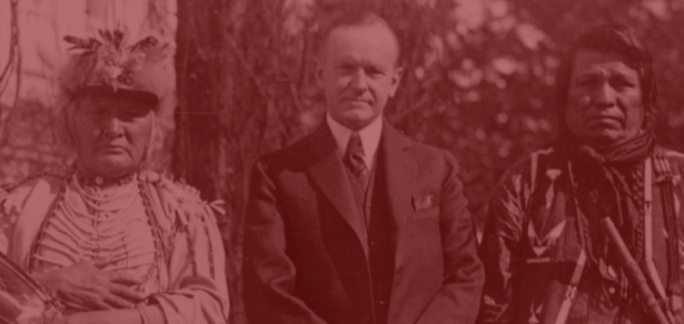
- Details
- By Levi Rickert
Bozho Readers,
In recognition of the 100th anniversary of the Indian Citizenship Act of 1924, Native News Online will devote the month of June to reflect upon the complex journey of Native American citizenship over the past century in a campaign we have entitled “Heritage Unbound: Native American Citizenship at 100.”
On June 2, 1924, President Calvin Coolidge signed the Indian Citizenship Act, also known as the Snyder Act. On that day, about 125,000 of the estimated 300,000 Native Americans alive became U.S. citizens. The majority had gained citizenship through intermarriage and/or land ownership.
The Act read that “all noncitizen Indians born within the territorial limits of the United States be, and they are hereby, declared to be citizens of the United States: Provided that the granting of such citizenship shall not in any manner impair or otherwise affect the right of any Indian to tribal or other property.”
Most Americans are unaware that women gained the right to vote before Native Americans became U.S. citizens. Studies have also shown that U.S. citizens know little, if anything, about Native Americans — 4 in 10 don’t even think Native Americans still exist. These facts underscore the need for greater awareness of our history and the present-day realities we face.
Native News Online is committed to bridging this gap. To mark this centennial, we’re launching a month-long commemoration — publishing essays, reporting stories, producing a video, and hosting a livestream — that will showcase the diverse and thriving Native American communities of today. Through these and other efforts, we hope to bring more awareness to our citizenship and the invaluable contributions we continue to make in this modern era.
We hope you will learn from our reporting during “Heritage Unbound: Native Citizenship at 100 and pass on this coverage so that more people become acquainted with how the first people of this continent became the last people to gain citizenship on Turtle Island.
Please join us tomorrow, Sunday, June 2, 2024 at 12 noon - EDT, for a stream to learn more about the significance of Native American citizenship on Native News Online's Facebook, X (Twitter), or YouTube channel to be inspired.
Chi Megwetch (a big thank you) for your continued readership and support.
Levi Rickert
Publisher/Editor

More Stories Like This
Native News Weekly (August 25, 2024): D.C. BriefsUS Presidents in Their Own Words Concerning American Indians
Oral History Project Announces 14th Stop in Portland, Oregon: NABS Continues to Gather Crucial Stories Across Indian Country
Sen. Bernie Sanders Endorses Peggy Flanagan for U.S. Senate
Shutdown’s End Brings Relief to Tribal Food Programs and SNAP Recipients
Help us tell the stories that could save Native languages and food traditions
At a critical moment for Indian Country, Native News Online is embarking on our most ambitious reporting project yet: "Cultivating Culture," a three-year investigation into two forces shaping Native community survival—food sovereignty and language revitalization.
The devastating impact of COVID-19 accelerated the loss of Native elders and with them, irreplaceable cultural knowledge. Yet across tribal communities, innovative leaders are fighting back, reclaiming traditional food systems and breathing new life into Native languages. These aren't just cultural preservation efforts—they're powerful pathways to community health, healing, and resilience.
Our dedicated reporting team will spend three years documenting these stories through on-the-ground reporting in 18 tribal communities, producing over 200 in-depth stories, 18 podcast episodes, and multimedia content that amplifies Indigenous voices. We'll show policymakers, funders, and allies how cultural restoration directly impacts physical and mental wellness while celebrating successful models of sovereignty and self-determination.
This isn't corporate media parachuting into Indian Country for a quick story. This is sustained, relationship-based journalism by Native reporters who understand these communities. It's "Warrior Journalism"—fearless reporting that serves the 5.5 million readers who depend on us for news that mainstream media often ignores.
We need your help right now. While we've secured partial funding, we're still $450,000 short of our three-year budget. Our immediate goal is $25,000 this month to keep this critical work moving forward—funding reporter salaries, travel to remote communities, photography, and the deep reporting these stories deserve.
Every dollar directly supports Indigenous journalists telling Indigenous stories. Whether it's $5 or $50, your contribution ensures these vital narratives of resilience, innovation, and hope don't disappear into silence.
 The stakes couldn't be higher. Native languages are being lost at an alarming rate. Food insecurity plagues many tribal communities. But solutions are emerging, and these stories need to be told.
The stakes couldn't be higher. Native languages are being lost at an alarming rate. Food insecurity plagues many tribal communities. But solutions are emerging, and these stories need to be told.
Support independent Native journalism. Fund the stories that matter.
Levi Rickert (Potawatomi), Editor & Publisher

